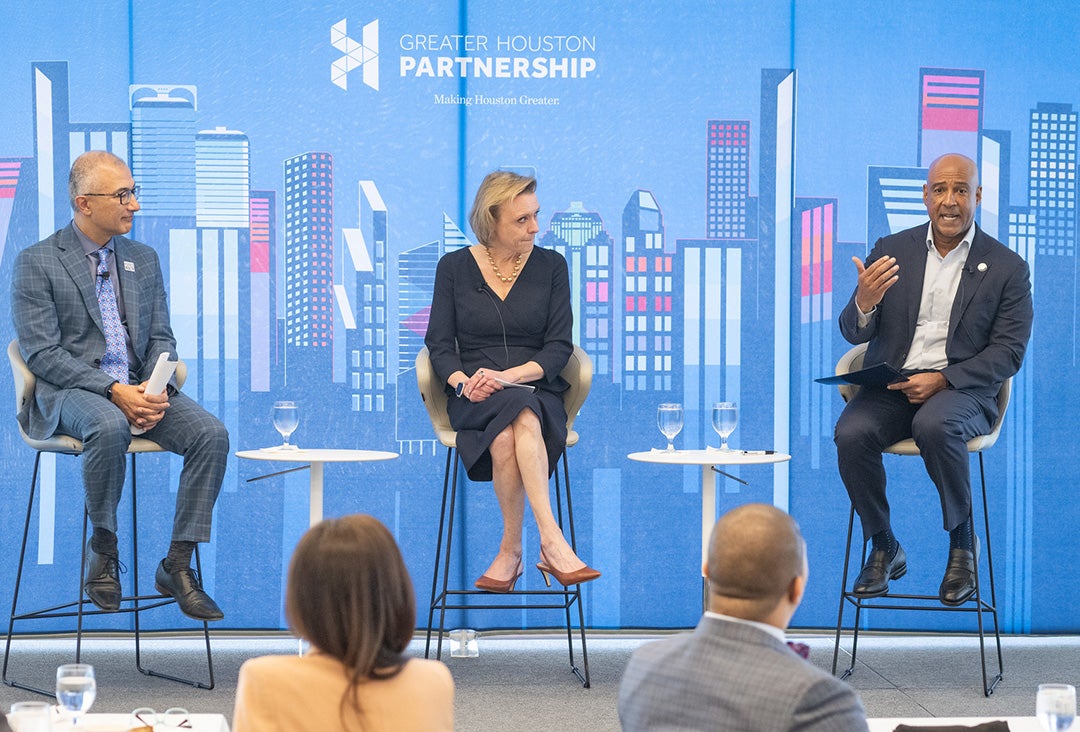
Rice University President Reginald DesRoches emphasized the university’s ambitious, collaborative approach to transforming health and medicine during a panel discussion hosted by the Greater Houston Partnership. Joined by leaders from the Cancer Prevention and Research Institute of Texas (CPRIT) and Harris Health, DesRoches outlined Rice’s vision for becoming a world leader in health innovation — a key component of the university’s strategic plan.
“I think there’s never been a more exciting time for the practice of medicine than there is now, and we’re seeing just a major transformation in … medicine because of technology,” DesRoches said during “The Future of Health Care” discussion Oct. 7 in downtown Houston.
For DesRoches, this transformation is personal. Just before he was inaugurated as Rice’s president in 2022, he underwent robotic surgery for prostate cancer. Now fully recovered, he sees firsthand how innovations in care and treatments are saving lives.
“We just rapidly see how technology is changing the practice of medicine,” he said. “My focus at Rice has been to figure out how we — a place without a medical school — will be the top health and medicine institution in the world without a medical school. And the only reason that we know we can do that is because we have the greatest asset across the street from us in the Texas Medical Center.”
DesRoches shared the panel with Kristen Doyle, CEO of CPRIT, and moderator Dr. Esmaeil Porsa, president and CEO of Harris Health. While institutions with medical schools often dominate health innovation, DesRoches argued Rice’s strength lies in its unique assets — especially its location next to the largest medical complex in the world.
“We have a set of expertise at Rice that really complements the incredible expertise that’s in Texas Medical Center,” he said. “We’re at a moment in time now where we’re seeing things like advanced materials, computing, imaging and robotics rapidly transforming the practice of medicine.”
Brain health as a strategic priority
One of Rice’s biggest investments in this field is in brain health and neuroengineering — an area DesRoches has been cultivating since his days as dean of engineering. In 2017, he recognized the emerging potential of engineers working alongside clinicians and neuroscientists and set out to make the university a leader in the field.
“At that time, we had a really great group of core people when I realized that we can be amongst the very best in the world in this space,” he said. He proposed hiring several new faculty members and collaborated with the Texas Medical Center to bring in a large group of affiliated experts. Today, that team has evolved into a world-class cohort forming the Rice Neuroengineering Initiative. Over the last three years alone, he said this brain-focused team has brought in more than $100 million in research grants.
And it’s not stopping there. DesRoches described how Rice is now integrating neuroengineering with neuroscience and public policy through initiatives like the Baker Institute for Public Policy’s new Neuro-Policy Program — creating a comprehensive, multidisciplinary approach to brain health.
DesRoches voiced support for Proposition 14, a statewide ballot initiative that would create the Dementia Prevention and Research Institute of Texas. Rice has been a key supporter of the proposal, which voters will decide on this November.
“If you can reduce neurologic-related disorders even by 5 or 10%, the impact it’s going to have on society — and economically, talking about the brain economy — is massive,” he said. “I think it could be absolutely transformational to the state and be a model for the rest of the world.”
The CPRIT effect and talent pipeline
DesRoches praised CPRIT for its statewide impact on research and recruitment. “We can’t underestimate that,” he said. “I appreciate you for the talent that synchronism enabled us to bring into the state of Texas. It is massive.” Rice is home to 26 CPRIT Scholars.
Beyond research, DesRoches highlighted efforts to prepare Houston’s future workforce for careers in health technology. He announced a new program with Houston Methodist, funded by the National Science Foundation, to upskill high school and community college students around digital health — introducing them to wearables, artificial intelligence and other emerging technologies.
“It’s going to have a huge impact,” he said. “It serves as a model for how we begin to prepare the next generation.”
Rice is taking a lead in redefining how universities engage with AI, particularly in health applications. DesRoches recalled a shift in institutional policy from just two years ago.
“We told students, do not touch it. Stay away from it,” he said of AI. “And now we’re showing them, this is how to use it responsibly.”
He emphasized the importance of coupling AI education with ethics, especially in health where the stakes are high. “I think those are things that every student needs to be exposed to, and it’s never been more important.”


